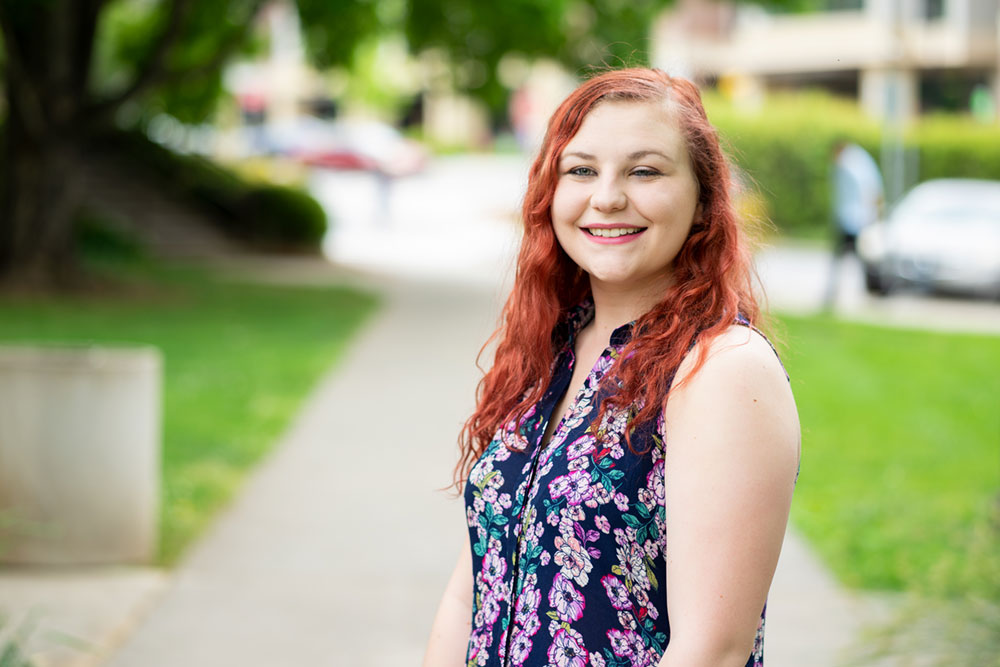- Admissions & Aid
- Decide to Succeed
- Stories
- Tumors Hamper But Don’t Stop Student from Living Her Best College Life
Tumors Hamper But Don’t Stop Student from Living Her Best College Life

At age 19, Victoria (Tori) Renfroe has about 30 years left to live, according to the hourglass she’s been handed by her doctors. That’s right, to age 49. Yes, she’s hopeful for a little more time, and with regular doctors’ visits, she might get it, she said. But in the meantime, she’s got college to finish, law school to attend, human rights to protect, a puppy to raise, a relationship to revel in and, well, you get the idea.
Renfroe, a Western Carolina University junior who is triple-majoring in business administration and law, international studies and Spanish, has a genetic disorder called Von Hippel-Lindau syndrome, a hereditary cancer predisposition that increases the likelihood of certain kinds of tumors. In Renfroe’s case, the likelihood happened. The tumors are hemangioblastomas – blood vessel tumors that occur in the brain, spinal cord and eye.
She currently has 16 of them. “I have six on my brain, five on my spine, one on my liver, three on my kidneys and one on my spleen,” she said.
They aren’t malignant – and only the ones on her kidneys have the potential to become so – but they do grow and cause enormous pain and serious side effects. Renfroe lost her left eye to a tumor in 2017; three days after graduating from North Henderson High School, she had it removed and later replaced with an acrylic eye.
Renfroe starts her mornings early, between 4:30 and 5 a.m., to prepare for a long day at WCU. She and her boyfriend of nearly five years, Daniel Dowling, a WCU sophomore, commute every day to WCU, leaving Hendersonville around 6 a.m. to arrive in time for his 8 a.m. class. The tumors are an unwelcome wake-up call each morning.
“My oncologist said it’s always going to be worse in the morning, and I find that to be true,” she said. “Typically, I will wake up with a headache, but what really gets me is the nausea. Literally, every day we drive to school I’m lying in the backseat because the movement makes me miserable. The problem is the nausea and the pain worsen in the afternoon, so you’re always battling something. Somedays it’s just too much to handle.”
But she is handling it, and carrying 18 credit hours on top of it. Renfroe said she has known about her condition since she was 10 years old, when her father passed away at age 38 from the same disease. His brother did, too, as did his father, doctors now suspect, because of the “huge tumor on his brain stem,” she said.
“I was really well prepared for this,” said Renfroe, whose younger sister also is a carrier, but half brother is not. “I knew my whole life that my dad was sick and my mom explained that it was something that I could have. Whenever you’re a carrier for the disease, you can go your whole life without getting sick or without having a tumor. But by the time I was 16, I had 16 tumors. I saw my dad sick. He was at home, and we had morphine pumps around the house after surgery and all kinds of crazy stuff.”
Putting her disease aside, Renfroe has set a fast and furious pace for herself: graduate from WCU, attend law school, then work for a human rights organization.
“I’ve always been drawn to the things that are happening across the world that are awful,” Renfroe said. “But they’re also interesting to me. Like right now, I feel like our constitutional rights are under attack. I feel like people who don’t speak English necessarily well or don’t understand their rights get taken advantage of.”
Renfroe said that by age 6 she was opinionated and had already developed a sense of justice. “I think there’s a right way to do things and you should fight for what you believe in,” she said. That sense of justice crystallized when she was 12 as she sat through the trial of the drunken driver who struck her mother on Dec. 2, 2011, leaving her partially paralyzed on her left side and with “mounds of medical bills that affect everything she does,” Renfroe said. Her paternal grandmother had died a month earlier and her dad in February of the same year.
“I was fascinated by the court case,” Renfroe said. “Nothing really happened to the gentlemen. He spent a couple of months in prison and never paid anything he was supposed to pay. We’re still having to constantly call the court and get them to track him down. It’s just a terrible situation. It’s crazy to think that happens to so many people.”
Luckily, Renfroe’s schooling is paid for, thanks to the Annexstad Family Foundation Leaders for Tomorrow Program that provides $25,000 in scholarship support over four years. She also receives the Jake Rusher and the T. Ray Gibbs scholarships and works weekends at a local restaurant in Hendersonville. She also was the recipient of a scholarship from the LEP Foundation for Youth Education for students who have cancer.
About twice a year, Renfroe heads to Duke University Medical Center to spend a week with her various doctors, and that troubles her. “I don’t like missing class,” she said.
Renfroe said she worked hard in high school to be able to attend college, but WCU wasn’t on her radar until she received a very special letter that took her aback and then reeled her in. It was from then-Chancellor David. O. Belcher, who was fighting his own battle with brain cancer. “Chancellor Belcher actually sent me a personal letter, because someone gave him my biographical statement, which talks about all my health issues. He explained his situation, which I had no idea about. This was before he had surgery. He explained he was inspired by hearing about me and he thought Western would be a great fit. I was about to graduate from high school. I got it in the mail and thought it was strange because I hadn’t applied yet,” she said.
In the letter to Renfroe, Belcher wrote: “Victoria, your story made its way to me and I felt the need to reach out to you. I am thrilled that you are considering Western Carolina University to be the setting of the next chapter of your life. While reading your biographical statements, I was overwhelmed with inspiration as I noticed many similarities between the two of us. I wanted to reach out and tell you personally that we would love for you to become a Catamount!”
Moved by Belcher’s kind gesture, among other things, Renfroe did become a Catamount, and she couldn’t be happier. This fall, Renfroe – with her doctors’ blessings – will spend the semester abroad in Ireland at the Galway-Mayo Institute as part of her international studies degree.
Renfroe said she is grateful to WCU for its extended kindness and help she has received, especially from the Office of Accessibility Resources. The Annexstad Foundation has helped her navigate insurance issues, which could have been a problem. “Plus, I got really lucky and I met my boyfriend about six months before I got sick, and he’s still around nearly five years later,” she said. “We met in high school and he’s helped a lot and my family’s very supportive, as is my community in Hendersonville. I’ve never felt alone. I already had so many plans before I got sick, so it didn’t really change anything.”
So what keeps her going? “Obviously, I have to put my health first because you can’t go to college if you’re dead,” Renfroe said. “Honestly, there’s just so much I want to do. Even though I have limited time, it just motivates me to do it sooner. That’s why I’m doing my three majors and I want to go to law school. I just want to accomplish so much before I don’t have any more time left. I just want to help people.”
What about that fake eye? It’s hand-painted acrylic, and something she certainly has some fun with. “I actually put it in my aunt’s drink once,” she said. “It was hilarious. I can pop it out in a second. It’s not hard to take out. If you don’t laugh about it, you’ll cry.”

